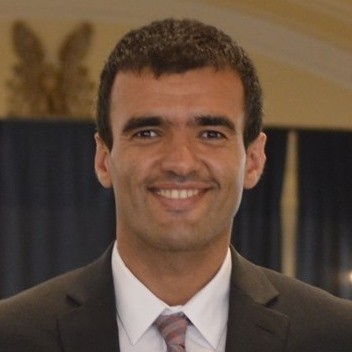Smartwatch-like wearables have enabled seamless tracking of vital signs and physical activities, but still lack a significant feature: they are currently unable to provide any information about brain states or to modulate brain function for optimizing human health and performance. This project aims to make it possible for wearables to feature such capabilities. Being aware of brain states is not only extremely valuable in clinical studies but is also crucial to improving human performance in various everyday life activities.
I am an associate professor of Biomedical Engineering at the New York University (NYU) where I direct the Computational Medicine Laboratory located within the NYU Langone Health's Tech4Health Institute. Prior to joining NYU, I was an assistant professor of Electrical and Computer Engineering at the University of Houston. The goal of my research is to develop algorithms for designing a MINDWATCH, i.e., smartwatches of the future that can monitor brain activity and use simple everyday actuators (e.g., music or light) to improve mental health and performance. I received my bachelor’s degree (summa cum laude) in Electrical Engineering (Honors Program Citation) from the University of Maryland, and S.M. and Ph.D. degrees in Electrical Engineering and Computer Science with a minor in Mathematics from MIT, where I was a member of the MIT Laboratory for Information and Decision Systems as well as the MIT-Harvard Neuroscience Statistics Research Laboratory. I completed my postdoctoral training at the Department of Brain and Cognitive Sciences and the Picower Institute for Learning and Memory at MIT as well as the Department of Anesthesia, Critical Care and Pain Medicine at the Massachusetts General Hospital. I am a senior member of IEEE and recipient of different awards such as an MIT Technology Review 2020 Innovator Under 35 award, a 2020 National Science Foundation CAREER Award, a 2020 Research Excellence award as well as a 2020 Teaching Excellence Award from the University of Houston's Cullen College of Engineering, a 2016 IEEE-USA New Face of Engineering award, a National Science Foundation Graduate Research Fellowship, an MIT Graduate Fellowship, and the University of Maryland's Department of Electrical and Computer Engineering Chair's Award. Moreover, I was selected by the National Academy of Engineering for the 2019 U.S. Frontiers of Engineering Symposium. In 2020, I was featured by the IEEE Women in Engineering Magazine as a “Woman to Watch”. Furthermore, I have been inducted into various honor societies including Phi Kappa Phi, Tau Beta Pi, and Eta Kappa Nu. My research interests include wearable technologies, medical cyber-physical systems, and control, estimation and system identification of biomedical and neural systems.
For more information, please visit my lab’s website: https://wp.nyu.edu/cml/
Origami-inspired structures that fold flat sheets along creases with designed patterns to create transformable structures have been widely applied in science and engineering, especially in space operations, e.g., for deployment of folded solar panels equipped on launched satellites. Although the deformation process plays an essential role in transitions between the origami states, few studies focus on the control and actuation of the origami folding mechanism toward high autonomy of the deformation process.
This research will create and validate new approaches for optimally managing mobile observational networks consisting of a renewably powered ?host? agent and ?satellite? agents that are deployed from and recharged by the host. Such networks can enable autonomous, long-term measurements for meteorological, climate change, reconnaissance, and surveillance applications, which are of significant national interest.
We are entering an age of unprecedented access to information, where transformational methodologies are demonstrating a clear vision of an autonomy-driven future. Self-driving cars, precision agriculture, robotic monitoring, and infrastructure inspection are but a few areas experiencing an autonomy revolution. To continue in this promising direction, it is critical that we facilitate the safe and reliable coordination of diverse cyber-physical systems (CPS).
This project explores frameworks, tools, and methodologies that enable fairness-aware, privacy-aware, society-in-the-loop, personalized Internet-of-Things (IoT) systems. Thanks to the rapid growth in mobile computing and wearable technologies, monitoring complex human context becomes feasible, which paves the way to develop human-in-the-loop IoT systems that naturally evolve to adapt to the human and environment state autonomously.
Rapid growth in additive manufacturing (AM) has improved the accessibility, customizability and affordability of making products using personal printers. Designs can be developed by consumers, if they have enough knowledge of mechanical design and 3D modeling, or they can be obtained from third parties. However, the process of translating a design to a program that can successfully executed by a 3D printer often requires specialized domain knowledge that many end-users currently lack.
Saman Zonouz is an Associate Professor at Georgia Tech in the Schools of Cybersecurity and Privacy (SCP) and Electrical and Computer Engineering (ECE). Saman directs the Cyber-Physical Security Laboratory (CPSec) which recently hosted a U.S. Congressional visit to demonstrate its research outcomes. His research (supported by ~$136M collaboratively) focuses on security and privacy research problems in cyber-physical systems including attack detection and response capabilities using techniques from systems security, control theory and artificial intelligence. Saman recently delivered the Plenary Keynote in DOE’s Cybersecurity Conference to a large audience (~2,000 people). His research has been awarded by Presidential Early Career Awards for Scientists and Engineers (PECASE) by the United States President, the NSF CAREER Award in Cyber-Physical Systems (CPS), Significant Research in Cyber Security by the National Security Agency (NSA), Faculty Fellowship Award by the Air Force Office of Scientific Research (AFOSR), Google Hall of Fame Security Award, Provost Research Award, Outstanding Faculty Research Award by the Georgia Tech College of Computing, and Cybersecurity Fellowship by the Georgia Tech College of Engineering. His research group has disclosed several security vulnerabilities with published CVEs in widely-used industrial controllers such as Siemens, Allen Bradley, and Wago. Saman is currently a Co-PI on President Biden’s American Rescue Plan $65M Georgia AI Manufacturing (GA-AIM) project. Saman was invited to co-chair the NSF CPS PI Meeting as well as the NSF CPS Next Big Challenges Workshop. Saman has received two Georgia Tech Teaching Awards for his courses “Cybersecurity of Drones” and “Critical Infrastructure Security”. Saman has served as the chair and/or program committee member for several conferences (e.g., IEEE S&P, USENIX Security, CCS, NDSS, DSN, and ICCPS). Saman obtained his Ph.D. in Computer Science from the University of Illinois at Urbana-Champaign.
This project aims to transform the software development process in modern cars, which are witnessing significant innovation with many new autonomous functions being introduced, culminating in a fully autonomous vehicle. Most of these new features are indeed implemented in software, at the heart of which lies several control algorithms. Such control algorithms operate in a feedback loop, involving sensing the state of the plant or the system to be controlled, computing a control input, and actuating the plant in order to enforce a desired behavior on it.
This project aims to create a cyber physical system for remotely controlling cellular processes in real time and leverage the biomedical potential of synthetic biology and microrobotics to create pancreatic tissue. With 114,000 people currently on the waitlist for a lifesaving organ transplant in the United States alone, the ability to directly produce patient-compatible organs, obviating the need for animal and clinical studies can revolutionize personalized medicine.
Today, operators of cellular networks and electricity grids measure large volumes of data, which can provide rich insights into city-wide mobility and congestion patterns. Sharing such real-time societal trends with independent, external entities, such as a taxi fleet operator, can enhance city-scale resource allocation and control tasks, such as electric taxi routing and battery storage optimization. However, the owner of a rich time series and an external control authority must communicate across a data boundary, which limits the scope and volume of data they can share.
Smart home products have become extremely popular with consumers due to the convenience offered through home automation. In bridging the cyber-physical gap, however, home automation brings a widening of the cyber attack surface of the home. Research towards analyzing and preventing security and safety failures in a smart home faces a fundamental obstacle in practice: the poor characterization of home automation usage.




